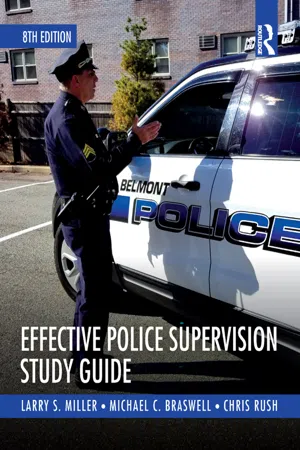
Effective Police Supervision Study Guide
- 170 pages
- English
- ePUB (mobile friendly)
- Available on iOS & Android
Effective Police Supervision Study Guide
About this book
Good police officers are often promoted to supervisory positions with little or none of the training it takes to be a good manager. An understanding of group behaviors and organizational dynamics is necessary to grasp the fundamentals of managing police officers. The Effective Police Supervision Study Guide coordinates with the core text used in many college-level classes and police departments to teach supervisory practices in criminal justice. This study guide prepares both students and professionals for academic or promotional exams, offering them an opportunity to fully review the material so that they are well-prepared for testing.
This new edition, like the new edition of the textbook it accompanies, includes information on the following topics: police accountability, police involvement with news media, the challenges of dealing with social media, updates on legal considerations, and ways to avoid another controversy like Ferguson, Dallas, or Baltimore.
Tools to learn more effectively

Saving Books

Keyword Search

Annotating Text

Listen to it instead
Information
CHAPTER 1 Supervision—The Management Task
LEARNING OBJECTIVES
KEY TERMS
Chapter Summary
I. Transition to First-Line Supervisor
II. Supervisory Skills
III. Management Expectations of the Supervisor
Table of contents
- Cover
- Half Title
- Title Page
- Copyright Page
- Table of Contents
- A Note to the Student
- Chapter 1—Supervision—The Management Task
- Chapter 2—Community-Oriented Policing and Problem Solving—Improving Neighborhood Quality of Life
- Chapter 3—Interpersonal Communications—Striving for Effectiveness
- Chapter 4—Motivation—A Prerequisite for Success
- Chapter 5—Leadership—The Integrative Variable
- Chapter 6—Team Building—Maximizing The Group Process
- Chapter 7—Change—Coping with Organizational Life
- Chapter 8—Performance Appraisal—The Key to Police Personnel Development
- Chapter 9—Coaching, Counseling, and Mentoring—Helping Officers Grow and Develop
- Chapter 10—Discipline—An Essential Element of Police Supervision
- Chapter 11—Internal Discipline—A System of Accountability
- Chapter 12—Supervising The Difficult Employee—Special Considerations
- Chapter 13—Supervising Minorities—Respecting Individual and Cultural Differences
- Chapter 14—Tactical Operations—Critical Incident Deployment
- Chapter 15—Labor Relations—Problem Solving Through Constructive Conflict
- Chapter 16—Homeland Security and Terrorism—A Changing Role
- Answer Key to Objective Questions
Frequently asked questions
- Essential is ideal for learners and professionals who enjoy exploring a wide range of subjects. Access the Essential Library with 800,000+ trusted titles and best-sellers across business, personal growth, and the humanities. Includes unlimited reading time and Standard Read Aloud voice.
- Complete: Perfect for advanced learners and researchers needing full, unrestricted access. Unlock 1.4M+ books across hundreds of subjects, including academic and specialized titles. The Complete Plan also includes advanced features like Premium Read Aloud and Research Assistant.
Please note we cannot support devices running on iOS 13 and Android 7 or earlier. Learn more about using the app